Live Yachting


Decoding Job Titles on a Superyacht Crew
Navigating the world of yacht crew titles can be as intricate as sailing itself. Each position, from Captain to Deckhand, plays a vital role in ensuring the smooth operation of a Superyacht. Understanding these titles clarifies the hierarchy on board and helps those aspiring to join this dynamic industry.
Jump in now to uncover your place in this thrilling world! This article breaks down essential yacht crew titles, explores lesser-known roles such as Stewardess and Chief Engineer , and offers tips on choosing the right path for a maritime career.
Key Takeaways:

- Understand yacht crew titles for clarity on roles and responsibilities on a Superyacht. Familiarizing yourself with crew responsibilities is crucial for success.
- Research the duties of positions like Chief Officer and Chief Stewardess , as they contribute significantly to the yacht’s smooth operation.
- Consider your skills when choosing a yacht crew title, and network for growth opportunities in the luxury service sector.
A Clear Guide to Yacht Crew Titles
Understanding the hierarchy of yacht crew titles is essential for anyone seeking to navigate the intricate landscape of the yachting industry. Roles including Head Chef and Bosun are clearly defined to ensure efficient operations and exceptional guest experiences on a Superyacht.
At the top of the yacht hierarchy is the Captain , who leads the crew and holds ultimate responsibility for vessel safety and navigation. This extends to various specialized positions like the Officer of the Watch and Purser , each playing a critical role in deck operations, maintenance, and interior services.
The Captain serves as the highest authority aboard a Superyacht. They are responsible for navigation, the safety of both crew and guests, and adherence to rules for safety at sea. This includes a thorough understanding of financial matters related to yacht operations.
In addition to these core responsibilities, the Captain manages the team, fostering effective communication and teamwork among crew members. This leadership involves making decisive choices during challenging circumstances to enhance operational efficiency and safety protocols.
To competently fulfill these duties, the Captain must hold relevant certifications, such as a STCW certificate (Standards of Training, Certification, and Watchkeeping) and ENG1 Medical (medical certification). These qualifications not only affirm the Captain’s expertise but also instill confidence in crew and guests, demonstrating a commitment to safety and professionalism on the open seas.
2. First Mate/Chief Officer
The First Mate, also referred to as the Chief Officer , plays a crucial role within the yacht hierarchy, acting as the Captain’s primary assistant in managing daily operations. This role is essential for ensuring safety during all deck activities and plays a significant part in overall crew management.
This position includes supervising deckhand duties and making sure each crew member is skilled and executing their tasks to the highest standards. The First Mate also participates in navigation, using charts and technology to plot safe courses, essential for minimizing risks at sea.
Maintenance responsibilities include regular inspections and repairs to keep the yacht in optimal condition. A comprehensive understanding of these duties enhances the crew’s efficiency and strengthens the overall safety and enjoyment of everyone on board.
3. Second Mate/Second Officer
The Second Mate, or Second Officer, is vital for smooth navigation and safety on the vessel. They assist the First Mate by supervising the deck crew and ensuring all tasks are done well.
This role is key to the vessel’s operation and maintaining safety at sea. They oversee watch duties, check navigational equipment, and train junior crew members in essential skills.
4. Third Mate/Third Officer

The Third Mate, or Third Officer, is primarily responsible for assisting the Second Mate while focusing on deck operations and training new crew members in safety at sea and navigation.
In this critical role, the Third Mate ensures the seamless operation of the vessel while on duty. This includes overseeing navigation equipment and monitoring the ship’s instruments for any irregularities.
The Third Mate also ensures crew safety by conducting regular drills and making sure all personnel are familiar with emergency procedures. Their vigilance during watch is essential for preventing accidents and ensuring compliance with maritime regulations.
By fostering a culture of yacht training and continuous improvement among the crew, the Third Mate enhances individual skills and significantly contributes to the overall effectiveness of the yacht’s operations.
The Bosun is the backbone of deck operations, overseeing deckhand activities, executing maintenance responsibilities, and ensuring the smooth function of all deck-related tasks.
This leadership role is crucial for the efficient functioning of the crew. The Bosun manages daily operations while providing essential training to deckhands in fundamental skills, such as line handling, knot tying, and the correct use of safety equipment.
They coordinate maintenance schedules for the yacht’s exterior, ensuring that all equipment, from winches to rigging, is in optimal condition.
By promoting a culture of teamwork and accountability, the Bosun helps develop a knowledgeable crew equipped to tackle challenges on the water with confidence and competence.
6. Deckhand
The Deckhand role is fundamental within the yacht hierarchy, as these crew members perform essential tasks to maintain the operational integrity, functionality, and overall guest experience of the yacht.
Their contributions are invaluable and include the following responsibilities:
- Clean the exterior and maintain equipment.
- Assist in onboard activities.
- Conduct maintenance checks and repairs.
Deckhands are typically assigned tasks related to cleaning various surfaces and equipment, preserving the vessel’s aesthetic appeal while ensuring safety.
Collaboration is vital in these roles, as effective teamwork enhances operational fluidity and contributes positively to the overall atmosphere on the yacht for both crew and guests.
7. Chief Engineer
The Chief Engineer has an important job within the yacht’s team. They oversee engine maintenance and technical operations, ensuring the yacht follows the rules that boats must follow.
They also supervise the technical staff and coordinate activities to maintain high safety standards. This leadership role involves training crew members to ensure they have the skills necessary for success.
This job requires careful monitoring of machinery and quick troubleshooting. The Chief Engineer must stay updated on changing maritime regulations to ensure engine operations meet legal requirements and industry best practices. This helps protect both the crew and the vessel while managing any financial matters related to operations.
8. Second Engineer
The Second Engineer assists the Chief Engineer with maintaining the yacht’s engine systems. They ensure all mechanical operations run smoothly, which is critical for the yacht’s overall performance.
- Conducting routine inspections
- Performing necessary repairs on machinery like generators, pumps, and heating systems
- Collaborating with other crew members to troubleshoot technical issues
By monitoring engine performance, they help optimize fuel efficiency and reduce potential hazards during voyages. Their proactive approach not only extends the lifespan of the yacht’s equipment but also enhances safety and comfort for everyone onboard.
9. Third Engineer

The Third Engineer assists the Second Engineer with daily maintenance tasks and is responsible for monitoring specific systems of the yacht.
This role requires a focus on ensuring that all machinery operates smoothly and efficiently. The Third Engineer also plays a significant role in training junior engineers, helping them integrate into crew responsibilities and sharing valuable insights on operational support.
The Third Engineer must conduct regular inspections and maintain accurate logs for maintenance records. They address any discrepancies promptly, fostering teamwork and promoting adherence to safety protocols, which contributes to a well-functioning engine room.
10. ETO/AV/IT Officer
The Electro-Technical Officer (ETO), or AV/IT Officer, plays a crucial role in ensuring the effective operation of all electrical and electronic systems onboard the yacht. They provide technical support for both crew and guests.
This professional troubleshoots electronic issues, from minor entertainment system malfunctions to complex failures affecting navigation equipment. The ETO makes sure the fun never stops by keeping all audio-visual setups running perfectly for events and gatherings.
Regular maintenance is essential; therefore, the officer conducts periodic checks and upgrades to keep everything current. By providing timely technical support, the ETO upholds the yacht’s standards and ensures a smooth and enjoyable journey for all passengers.
Other Yacht Crew Titles to Know
In addition to the primary titles mentioned, the yacht hierarchy includes several other important roles, such as the Chief Officer, Chief Engineer, Chief Steward, Stewardess, and Head Chef.
Each position plays a vital role in the overall operations and guest experience aboard a superyacht.
1. Chief Officer/First Officer
The Chief Officer, commonly referred to as the First Officer , plays a critical role in managing the crew and ensuring the safety and efficiency of all yacht operations.
This important position encompasses a broad spectrum of leadership responsibilities , including:
- Managing crew efficiency.
- Supervising the deck crew.
- Enforcing safety protocols.
- Mentoring junior crew members.
Effective training and development are essential components of their responsibilities, enabling the crew to perform various tasks with confidence and competence.
Through strong communication skills and a commitment to teamwork, the Chief Officer significantly contributes to fostering a positive working environment, ensuring that all personnel are aligned with the yacht’s operational objectives.
2. Chief Engineer
The Chief Engineer plays an important role in maintaining the integrity of all engineering systems onboard, ensuring that technical operations adhere to safety and performance standards .
This role encompasses a broad array of responsibilities, including:
- Overseeing engine maintenance.
- Managing fuel efficiency.
- Ensuring compliance with regulatory requirements (rules that must be followed).
The Chief Engineer possesses extensive technical expertise, allowing for swift and effective troubleshooting of complex mechanical issues.
They are responsible for:
- Supervising the engineering crew.
- Facilitating ongoing training.
- Fostering a culture of safety.
By coordinating regular inspections and implementing preventive maintenance schedules, the Chief Engineer is instrumental in minimizing downtime and enhancing the vessel’s overall performance, thereby achieving operational excellence at sea .
3. Chief Steward/Stewardess

The Chief Steward or Chief Stewardess holds a crucial position in delivering an exceptional guest experience, overseeing all interior services and ensuring that the yacht’s luxury standards are consistently upheld.
- Training and managing a dedicated team of stewards.
- Ensuring gourmet meal service meets high standards.
- Meticulously arranging guest suites.
Every interaction with guests is designed to exceed expectations , seamlessly blending professionalism with warm hospitality.
By curating personalized experiences , they not only address the immediate needs of those on board but also anticipate requests to enhance overall satisfaction.
Their meticulous attention to detail and unwavering commitment to excellence foster an inviting atmosphere, embodying the essence of luxury service that guests expect throughout their voyage.
4. Head Chef
The Head Chef is responsible for creating an exceptional dining experience onboard while managing kitchen operations, menu planning , and staff training to ensure culinary excellence.
This important role extends beyond the confines of the kitchen. The Head Chef’s culinary qualifications are essential in curating a menu that delights the palate and embodies the luxury service that the establishment seeks to provide.
By carefully selecting fresh ingredients and innovating recipes, the Head Chef guarantees that each dish is a masterpiece , designed to elevate the overall guest experience.
The leadership and mentorship provided to kitchen staff cultivate an environment of growth and creativity , ultimately enhancing the quality of meals served.
In essence, a skilled Head Chef plays an essential role in transforming a meal into a memorable occasion , leaving guests with lasting impressions of fine dining .
How to Choose the Right Yacht Crew Titles for Your Career Goals
Are you ready to embark on an exciting career in yachting? Selecting the appropriate yacht crew title is essential and should closely align with one’s career objectives . This decision necessitates a comprehensive understanding of individual skills , experience , and the various roles available within the yachting industry, ranging from Deckhand to Captain.
1. Consider Your Experience and Skills
Assessing your experience and skills is the initial step in selecting an appropriate yacht crew title. This helps identify where you fit within the yacht roles and which positions may be suitable.
To effectively evaluate your skills, consider the certifications held and any relevant training. For example, STCW certifications —safety training courses required for working on yachts—can significantly enhance your professional profile.
Reflecting on past experiences, such as previous positions on similar vessels or roles requiring key competencies , provides valuable insights. This thorough examination deepens your understanding of potential contributions and informs you about further education or certifications that may enhance employability within the competitive yacht industry.
2. Research the Yacht and Its Crew
Conducting comprehensive research on the yacht and its crew dynamics is essential for understanding the working environment and how it aligns with your career objectives.
Familiarize yourself with:
- The yacht’s operational style
- The yacht’s hierarchy
- The crew roles, from the captain to the deckhands
- Financial aspects like salary expectations and tips
Understanding these factors ensures you are prepared for the economic realities of the position. This knowledge can impact not only your professional trajectory but also your personal satisfaction while aboard the yacht.
3. Network and Get Recommendations
Networking and obtaining recommendations from industry professionals can provide invaluable insights into securing the right yacht crew position that aligns with your career goals and aspirations .
By engaging with fellow crew members and industry insiders, you can access concealed job opportunities and develop meaningful connections that may lead to future employment. Attend industry events, join relevant online forums, and participate in yacht exhibitions to enhance your visibility within the sector.
Experienced crew members often serve as essential referees , providing endorsements that can distinguish candidates in a competitive job market . Cultivating these relationships strengthens your professional profile and fosters a supportive community, crucial for navigating the unique challenges of the yachting industry.
4. Be Open to Opportunities for Growth in the Yacht Roles
Being receptive to opportunities for growth within the yacht crew hierarchy facilitates career advancement . This enables the acquisition of diverse experiences and skills that enhance future prospects in roles such as Deckhand , Stewardess , and Captain .
This approach not only bolsters your capabilities but also cultivates a team-oriented environment that encourages collaboration. A willingness to assume new roles fosters a comprehensive understanding of yacht management , including navigation and guest experience .
Continuous training is essential in this dynamic field . By actively engaging in yacht training , skill enhancement programs , and workshops , you refine your technical expertise and gain invaluable insights into different facets of the industry. This ultimately positions you as a versatile professional ready to tackle any challenge, from cleaning tasks to maintenance duties .
Similar Posts

A Day in the Life of a Yacht Crew Member
Yacht crew life is an exhilarating blend of adventure, responsibility, and teamwork, set against the stunning backdrop of the open sea, especially in the superyacht industry. From the hierarchy that defines roles on board to the specific duties of each crew member, this article explores what it truly means to live and work on a…

Comparing These Two Water Vehicles
Choosing the ideal craft for your time on the water can be a delightful yet daunting task. Let’s find your perfect boat or pontoon for unforgettable days under the sun! Whether you’re drawn to the sleek lines of traditional boats or the spacious comfort of pontoons, each offers unique advantages for relaxation. This article explores…

What The Heck Is The Difference?
When it comes to enjoying life on the water, choosing between a yacht and a speed boat can significantly impact your experience. Both offer unique advantages tailored to different adventures and leisurely pursuits. This article explores the defining features of each vessel, including luxury boats, examining their size, speed, amenities, and costs. It also discusses…

Understanding yacht crew pay can be complex yet rewarding. Various factors come into play, from the specific job title to the size and location of the yacht. This article explores the key elements that influence salaries and presents average earnings for different positions. It also highlights the additional benefits crew members may enjoy and shares…

Shocking Yacht Crew Stories from the High Seas
Are you curious about what goes on behind the scenes of luxury yachting, including tales of sea horror? Get ready for thrilling adventures at sea! The world of yacht crews is a fascinating blend of adventure, responsibility, and sometimes unexpected drama. This article covers the roles and duties of crew members, as well as the…

Knowing The Difference Between A Yacht & Fishing Boat…
When it comes to exploring the open waters, choosing between a yacht and a fishing boat can be a daunting decision. Each vessel offers its own unique set of features and advantages tailored to different experiences. This guide breaks down the essentials of yachts and fishing boats, examining their types, costs, and safety considerations. Know…
Leave a Reply Cancel reply
Your email address will not be published. Required fields are marked *
Save my name, email, and website in this browser for the next time I comment.
- Yachting for beginners
- Owning a yacht
- Motor Yachts
- Sailing Yacht
- Indian Ocean
- Mediterranean
- Buying or Selling a Yacht
- Yachting Events
- FAQ – Luxury Yacht Charter
- FAQ – Buying a Yacht
- FAQ – Sell your Yacht
- How Much Does It Cost To Charter A Luxury Yacht?
- All our Blog Post & News

Yacht crew positions : Hierarchy, Missions & Salaries explained
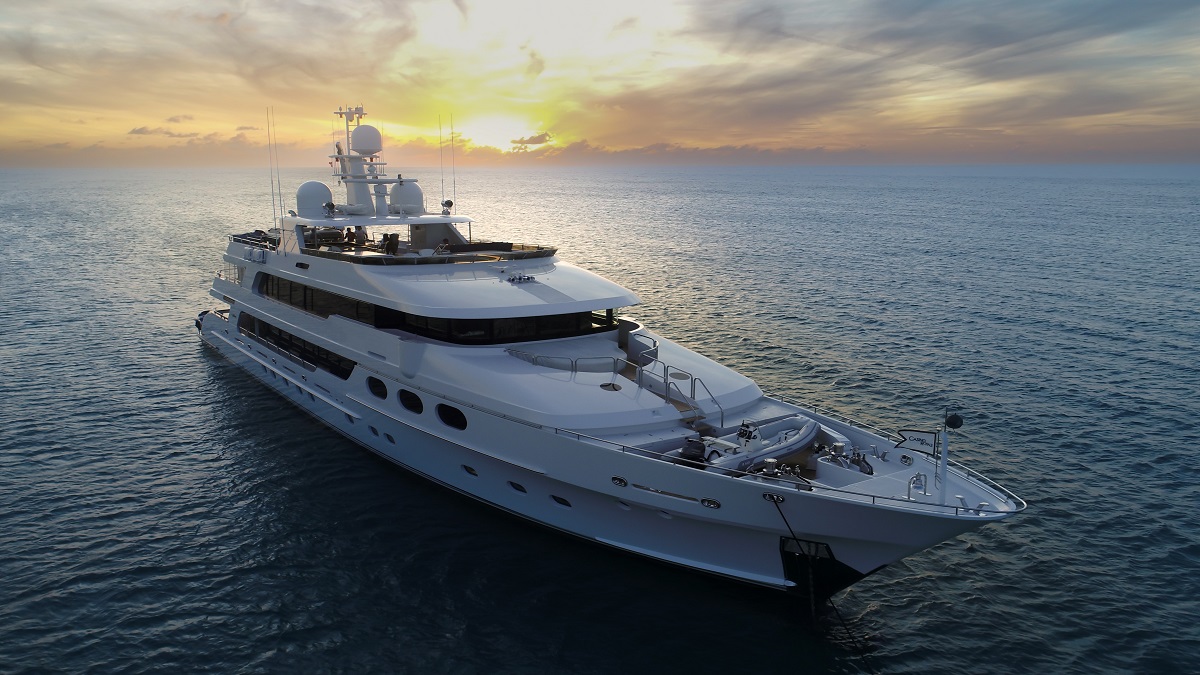
Like any well-run hotel, restaurant, or other luxury service, a crewed yacht needs organized structure and good management. Whether you’re staffing your own luxury vessel or looking for an exciting career working and traveling the world, you need to know how this structure works, and what you can expect to pay or earn and do in the various roles on board.
Every yacht is a little different, and organization may reflect the style of the captain or the demands of the owner. But the same jobs need to be done on almost every boat. Organized with ranks, heads of each division report to the Captain. It’s not a military-style organization, but there are parallels with merchant marine grades and structures.
Smaller yachts need fewer crew, and staff may wear multiple hats that cross more traditional divisions and may combine some jobs with others. Large yachts have more distinct divisions or subdivisions, with more specialization to divide tasks and manage staffing. The core skills are the same, but finding staff with the right blends to do the jobs is key. Crew with broader skills are highly sought after.
As a yacht owner, you shouldn’t have to worry about day-to-day management decisions or organizing all this. That’s why you have a captain, and it’s better to leave staffing decisions entirely up to him or her. But it’s still important to know what it is people you’re hiring do, why they’re there, and how many you need. You don’t want too many crew, or to be short-handed. An understanding of what your yacht needs helps you talk to the captain to keep your yacht running how you want it.
For those looking to break into yacht crew work, consider your skills and strengths, and what jobs appeal to you. You’ll need training before you work, and you can direct your job path through the training you seek. Your goal is a suitable position on a well-run yacht, so make yourself the most attractive candidate possible.
Yacht Work Life
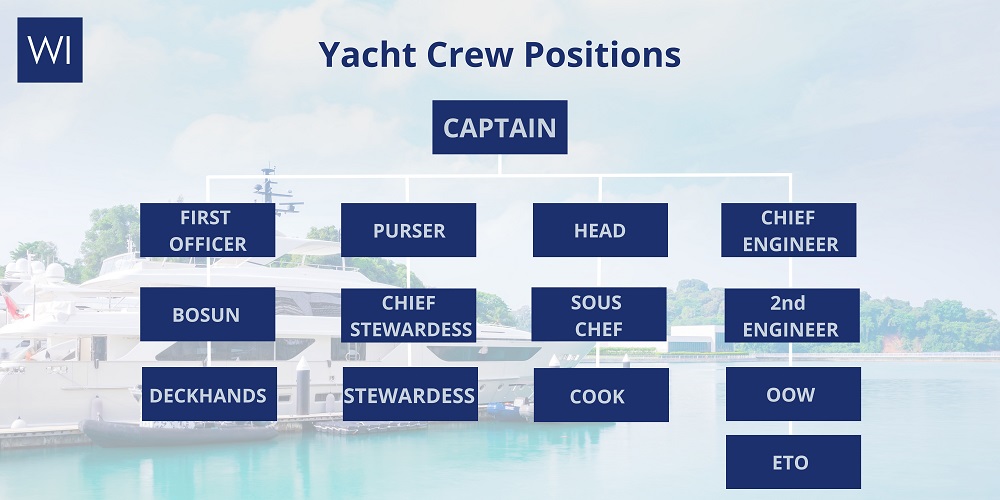
Working on a yacht is also living on the yacht. Crew must have a space to sleep, food, and all the basics that any employee needs. Large yachts have space reserved for crew, and owners looking for quality crew should provide good working and living conditions. Your crew takes care of you, and you should take care of them.
Depending on where a yacht operates or what flag she flies, a variety of labor laws or rules may be in effect. These requirements may be for work visas, contracts and written agreements, and compliance with merchant and ship crew treaties and laws. Be prepared to have work and non-disclosure agreements between yacht and crew, though a few yachts skip this.

Seasonal Jobs
Many yacht positions are seasonal. Year-round employment is more likely for senior crew like the captain and department heads, but not all yachts see year-round use. And some yachts may use different crew in different locales between seasonal moves.
Any job listing should give seasonal information, with geographic information, the length of the season, and the prospects for year-round positions and repeat employment.
Hours, Salaries, and Expectations
Yacht crew is a service job at its core, and every yacht owner is looking for service-oriented people who understand how to deliver a hotel-quality living and restaurant-quality fine dining. Work experience in luxury hotels and restaurants is a big plus for some jobs, and makes breaking into yacht work easier.
Yacht work can be very demanding, with periods of intense work when the owner and guests or a charter party is on board. Long days aren’t uncommon, but often balance with slack time when the boat is empty of passengers. There is always work to be done, but there’s usually a chance for time off.
Most salaries are monthly, since many positions are seasonal. Pay ranges are commensurate with experience, rank, and responsibility. Private vessels usually offer higher base pay, as charter crew can earn tips on top of their base salary. Because of the demands of the lifestyle, compensation is good and you have minimal living expenses on board.
Benefits and Time Off
Because so many jobs are seasonal and may occur in different countries and locations, benefits offered to yacht crew vary widely. But it is not uncommon for crew to be offered health and accident insurance and a flight to the vessel. Living on board, you’ll get food, rooming (usually shared), basic toiletries, uniforms, and laundry. Yachts with a longer view may offer additional training to long-term prospects.
Time off is usually linked to boat use, and may be sporadic in-season or when the boat has the owner and guests on board. There will always be some time off, but it may be between very intense work periods.
Most crew jobs have an employment contract that meets the Maritime Labour Convention 2006 (MLC). This should spell out the contract period and duration, as well as salary, leave and time off, probationary periods, repatriation policies, and any other crucial details to meet the minimum international standards of crew welfare.
This contract should also contain shipboard policies on confidentiality and non-disclosures, drug and alcohol use on board, personal hygiene expectations, interpersonal relationships, and dispute resolution. Job expectations and requirements can also be included, with specific language about roles, tasks, and cooperation between divisions.
Note that all crew agreements will explicitly prohibit drug use on board, most limit alcohol consumption and ban hard liquor on board, and many boats have policies prohibiting intimate personal crew relationships. Because the crew is living on board full time and in close quarters, rules to maintain decorum and crew harmony may be in writing.
Training & Certificates
Two key certifications are required for yacht crew. Employers look for the STCW (Standards of Training, Certification and Watch-keeping for Seafarers) and the ENG1 (Seafarer Medical Certificate). Insurers generally require crew to have these two certifications or the equivalent.
The ENG1 isn’t a class. It’s a medical exam to ensure that the crew is physically fit to serve at sea and has no underlying conditions that may arise far from help. It’s best for prospective crew to secure the ENG1 before investing more time and money training.
STCW is a week-long class on the basics of onboard safety. This includes hands-on modules covering personal survival, fire safety, first aid and CPR, accident prevention, and security awareness. It needs to be refreshed every five years.
Shared, Hybrid, and Crossover Jobs
Larger vessels will have more defined duties and specific areas of responsibility. But smaller yachts may want the crew to have different roles in different situations. For example, a hybrid job description may read “3rd Engineer/Steward” and describe a role in engineering when the boat is empty but on inside crew when passengers are on board.
When hiring or seeking jobs be prepared to look for creative crossover skill sets to meet the needs of the vessel.
Extra Skills and Duties
Any extra skills outside the regular duties makes crew more attractive. From stewards who can teach yoga, give massages or play cocktail piano to deck crew who know how to water ski, SCUBA dive, or fish, anything that crew can bring to enhance the passenger experience adds value to the employee.
If you’re looking for a position, list the skills you’d be comfortable using. If a vessel owner is looking for something specific, spell it out and figure out how that special duty fits into the employee work day.
The Four Main Divisions

Most yacht crews break into four primary divisions which group related tasks and responsibilities together. While the grouping sounds like it’s by section of the boat, they’re really more functional. For example, stewards (Interior) will definitely serve meals, whether they’re in the main dining room or out on deck. Deckhands (deck) are going to be involved in painting, sanding, and varnish jobs anywhere on the boat.
The deck crew handles most of the exterior operations of the yacht, and runs it. Deck hands and crew keep the boat looking clean and shiny, and handling most vessel operations. This includes driving and operating the yacht, navigation, running all launches and ship’s craft, handling lines, and all maintenance and painting, washing, and shining.
2-Interior (or Inside)
Inside crew are primarily the stewards and housekeepers. Larger vessels will have a dedicated housekeeping staff separate from the stewards, but smaller vessels may not.
Stewards keep the interior clean, do all housekeeping, laundry, food and beverage service, cabin preparation, and anything else needed for the comfort of the passengers.
3-Engineering
Below decks, the engineering department ensures the safe and smooth running of all the ship’s machinery and electronics. Engineers are engine and systems specialists, and there will usually be a dedicated electronics expert. Most engineer jobs require professional training and certification.
Fine dining is a hallmark of the yachting experience, and a full-time galley crew prepares all meals for passengers and crew. The head chef plans the menus and provisions the boat, while junior chefs assist the head chef with meal preparation and keeping the galley spotless.
Yacht Job and Department Details
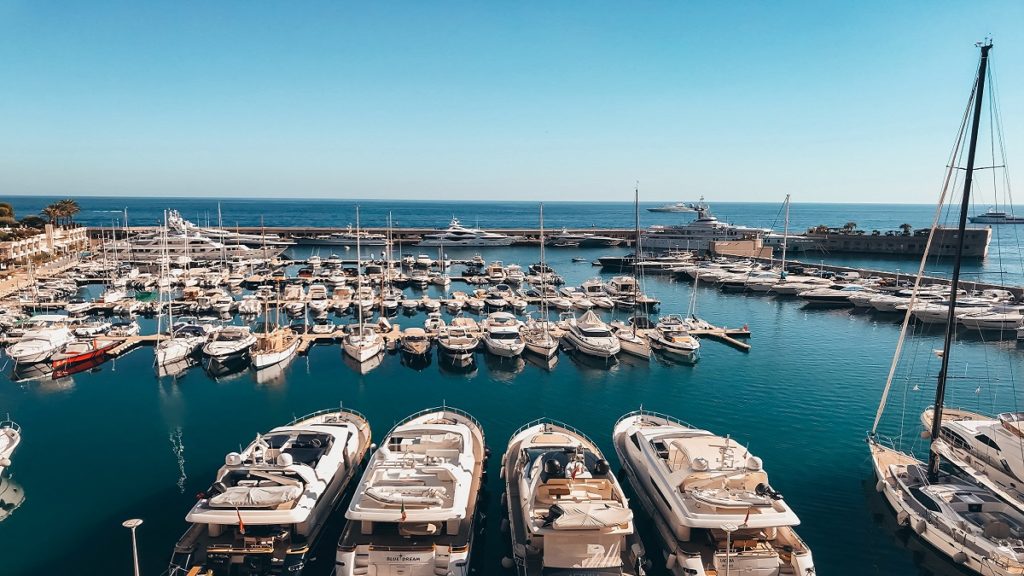
Departments are all organized in a hierarchy, with a department head reporting to the Captain. The clear chain of command makes for smooth operations, with all communications going up and down ranks. Junior staff will occasionally take instructions from other divisions as all crew is expected to help as needed. A captain or department head may organize staff differently, so reporting structures listed are guidelines only.
All salary ranges are monthly figures and are ranges based on yacht size and crew experience. Senior jobs on larger yachts have more responsibility than the same job title on yachts with smaller crews. Experienced crew are very desirable and can expect more pay for their positions.
Listed responsibilities are not exhaustive, and different yachts may allocate some jobs to different positions.
Read also: The yacht charter experience ladder
The Captain

The captain of the vessel is the overall decision maker for the yacht in all situations, including the safety of the vessel. The owner should leave the Captain responsible for operational decisions about hiring and staff and operating the ship. To become a captain requires years of experience and training, and a broad set of skills including yacht operations, personnel management, budgeting and finance. The captain works directly with the owner and owner’s representative, if the captain is not also acting as the representative.
On an organization chart, the Captain is usually placed in the deck division, but the Captain is always the senior-most crew on the yacht and all division heads report to the Captain.
Responsibilities include:
- Responsible for all navigation and running the yacht.
- Senior decision maker on all crew hiring.
- Manage repairs, refits, and yard work.
- Manage budgets and accounting. On larger yachts, this task ends more on the Purser, but the captain is always responsible.
- Ensure all paperwork, clearances, and legal requirements are completed.
- Primary contact with the owner or charter parties.
Reports to: The yacht owner
Salary Range: $6,000 to $22,000
The deckhands handle all the outside responsibilities of the ship, including cleaning and maintenance of the yacht and all the ship’s vessels and toys on board. Deck crew will have significant contact with passengers in this role, operating launches and delivering guests to and from shore and handling the toys.
All deck crew have watch responsibilities on passage, and daily responsibilities keeping the yacht pristine and clean. They will also do line handling and secure the yacht.
Deck department : Chief Mate/First Officer
The Chief Mate or First Officer is the second in command of the vessel, and left in charge when the Captain is not on board. The first mate has the requisite skills to stand in for the captain and run the yacht if needed and usually acts as the division head of the deck team.
The seamanship skills needed are similar to the Captain’s position.
- Primary safety officer for the yacht and all passengers and crew.
- Supervise and manage all operations on deck.
- Bridge watches on passage.
- Passage planning and navigation.
There may be additional mates on larger vessels, these 2nd, 3rd, etc. mates have similar responsibilities on rotation. But the first mate is senior and always second in command.
Reports to: Captain
Salary Range: $4,000 to $9,500 (First mate)
Second and more junior mates may earn $2,000 to $4,000
Deck department : Bosun
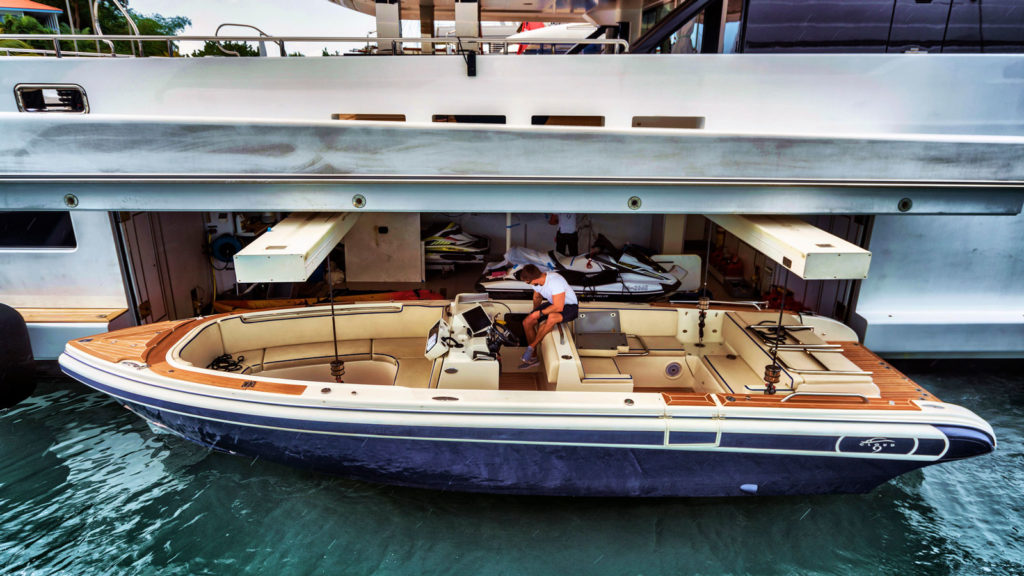
The Bosun is the senior deckhand and manages the junior hands on board. This will usually be the most experienced hand on board.
- Organizing all operations on deck.
- Coordinating the use, storing and launching of the ship’s boats, toys, and equipment.
- Managing the passerelle, watching passenger safety.
- Contact point for guest service on boats, toys, and trips to shore.
Reports to: First mate
Salary Range: $3,000 to $5,000
Deck department : Deckhands
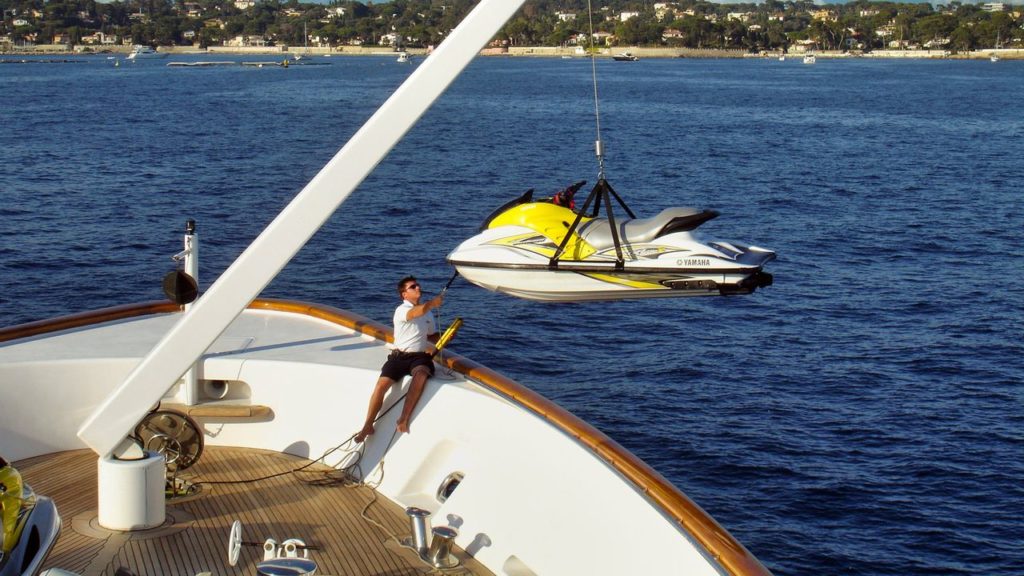
Deckhands are constantly busy with maintenance, cleaning, polishing, and assisting guests as needed. They will assist other departments as needed or given special duties.
- Daily cleaning of the yacht’s exterior.
- Painting, varnishing, polishing.
- Line handling.
- Launching and operating dinghies and tenders.
- Repairs and carpentry.
- Helping guests as needed – everything from handling baggage and gear to embarking and disembarking.
Reports to: Bosun
Salary range: $1,300 to $3,000
Though every position on a yacht is service-oriented, the interior or inside crew provides the primary customer service. They will interact the most with the passengers daily, and they’re directly responsible for the quality of their experience on board.
Interior department : the Purser
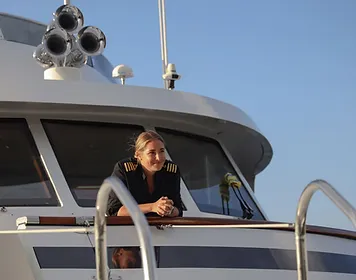
The purser is the chief financial officer of the yacht and handles all the financial operations on board. Accounting, purchasing, payroll and hiring, and all money matters end up with the Purser. This is a senior staff position, and may be the interior department head. Smaller yachts may eliminate the purser’s job and add it to the captain’s and other senior staff duties.
Responsibilities Include:
- Accounting and bookkeeping for all financial transactions.
- Human resources and payroll.
- Handling logistics for all departments related to purchasing.
- Managing contracts.
- Event coordination, including off yacht bookings and payments.
- Primary administration of the boat’s business paperwork.
- Inventory and supply management.
Salary Range: $4,000 to $8,000
Interior department : The Chief Steward/ess

The chief steward or stewardess has primary responsibility for all service roles inside. Food and drink service, cabin preparation, and anything to do with helping the passengers be more comfortable and enjoy their stay. The chief steward will be inside crew with several years of experience.
The chief steward manages the interior staff, setting and enforcing vessel service standards. The chief steward ensures the crew delivers a five-star hospitality experience.
Chief Steward Responsibilities:
- Scheduling and training junior crew for meal and drink service and cabin preparation.
- Primary contact with guests for meals and drinks.
- Sommelier and wine service.
- Coordinate with the galley for meals and presentation.
- Decorate the interior, from flower arrangement to table settings.
- Arrange onshore activities and outings.
Reports to: Captain or Purser, depending on the yacht
Salary Range: $4,000 to $8,500
Stewards/Stewardesses
The stewards and stewardesses are the primary guest service staff. They will work closely with guests and passengers, and have daily contact with them as they meet most of their needs while on board.
Steward Responsibilities:
- Food and drink service.
- Room preparation and turndown service.
- Cleaning, polishing, housekeeping, and inside maintenance.
- Cabin detailing.
- Laundry, pressing, and folding.
- Help with outings, trips, debarkations.
Reports to: Chief Steward
Salary Range: $1,500 to $4,500
Housekeeping

Larger yachts may have a dedicated housekeeping and laundry staff. This will be part of the inside crew, under either the purser or the head steward. There may be a senior housekeeper, if there are more than one housekeeping crew on board.
Responsibilities are the cleaning and laundry portions of the steward’s job, and a laundry steward may spend most of her time inside the ship’s laundry.
An experienced Head of Housekeeping may earn from $4,500 to $7,000, while a Laundry Steward typically earns from $2,500 to $3,500.
Read also: CAN OWNING A YACHT TO CHARTER (REALLY) BE PROFITABLE?
Food service requirements on any yacht are high. Whether it’s a privately owned vessel or a charter, the expectations are always for top tier food service, with a variety of meals planned for the requirements of every passenger. Chefs and cooks prepare all meals on board for passengers and crew, but sometimes other interior crew may help with prep work or cleanup.
Smaller yachts have smaller galley crews, but the largest vessels may have an executive chef and several sous chefs. All chef positions require formal culinary training and experience, but cook positions are often entry level. Promotion from cook to chef is unusual without additional training.
Galley department : the Head / Executive Chef

On larger yachts, an Executive Chef will run the entire galley with the help of sous chefs and cooks. With an Executive Chef, there’s an expectation that the food and menus will be on a level with Michelin star-rated restaurants.
The executive chef brings a thorough understanding of food preparation and presentation, and moves food preparation past creative up to artistic. Job responsibilities are similar to a chef, but the job demands and the required experience and education are much higher.
Salary range: $7,000 to $11,000
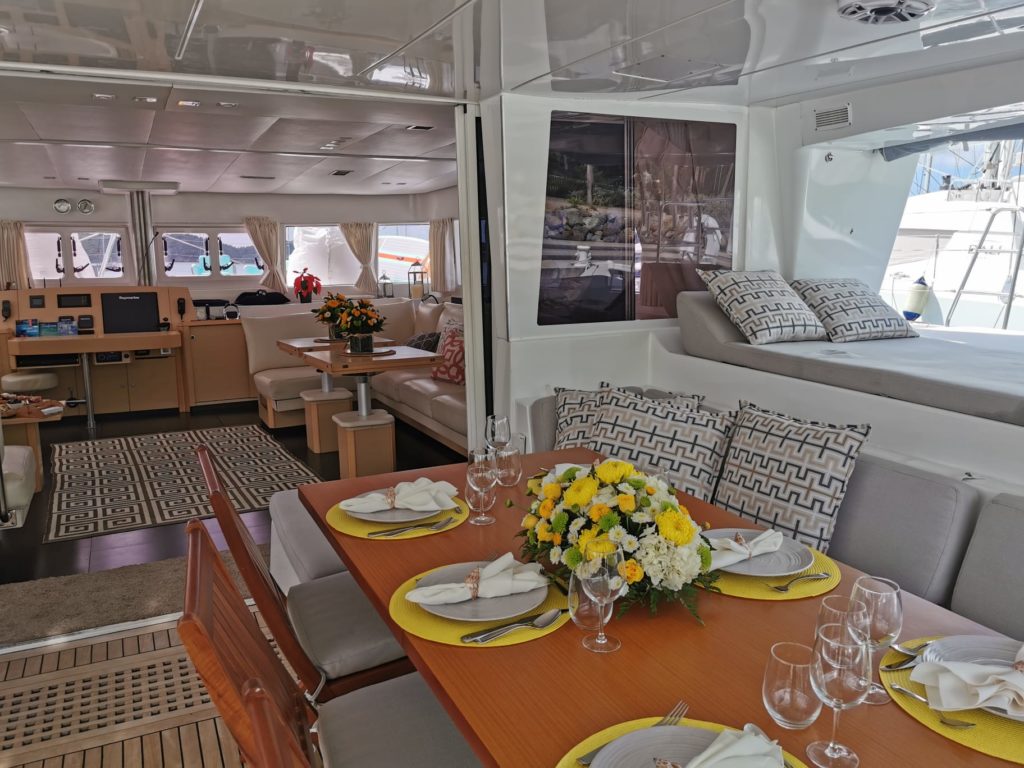
The chef has overall responsibility for all meals on the yacht, from provisioning in remote places to hygiene and good safety. If there’s only one chef, she’s the head of the galley crew. Finding the best provisions in far away locations and making the best of local food availability is a major part of the job.
- Planning a delicious and varied menu for passengers.
- Sourcing all food and arranging transport to the yacht.
- Maintaining and operating within the galley budget.
- Preparing passenger meals with professional presentation and style.
- Cleaning and maintaining galley and galley equipment.
- Deliver menus and meals on time, while running an organized and spotless galley.
Galley department : Sous Chef
The sous chefs assist the chef in all aspects of running the galley, and may have independent assignments to plan and guest and crew meals. While not primarily responsible for provisioning, the sous chef will help with food selection, menu preparation, and planning. A sous chef must have formal culinary training.
Reports to: Head chef
Salary Range: $3,500 – $6,000.

Galley department : The Cook
Cooks may be entry-level positions or experienced, but do not require formal gastronomy education. They will assist the chef and sous chefs, cooking meals and dishes for guests and crew, helping with provisioning, and keeping the galley neat.
- Assist with provisioning and buying high-quality food from local sources.
- Follow all food handling and safety guidelines.
- Assist the head chef as needed, taking direction and guidance.
- Prepare guest and crew meals as required.
- Staying on top of galley inventories and supplies.
Salary Range: $2,500 to $3,500
Engineering
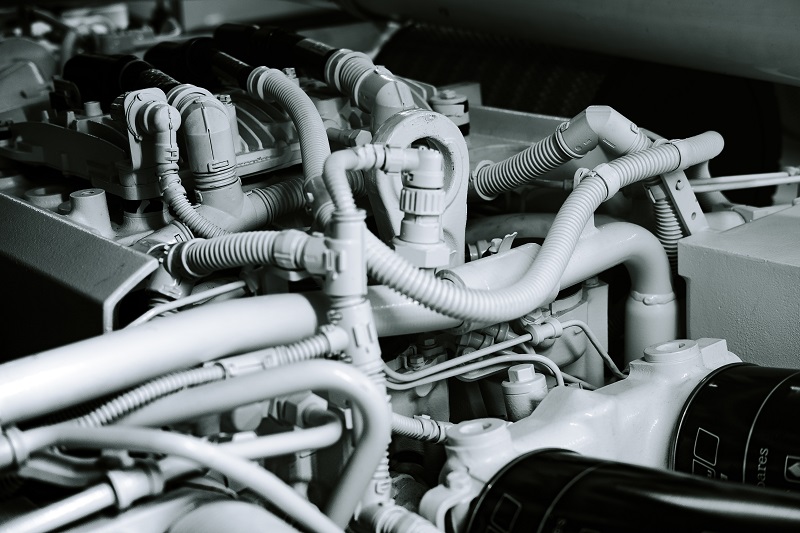
The engineering department keeps the yacht and all its systems working. Whether it’s the engines, electronics, air conditioning, or the plumbing – it’s up to engineering to keep it running.
There is considerable overlap with commercial shipping in the engineering field, as many of the same skills apply. And there is a broader range of qualifications and grades based on the size and power of the vessel. Job ratings may be set by required experience based on tonnage of ship or power of engines, with corresponding levels of pay and responsibility.
Unlike commercial shipping, engineers may get involved in other aspects of running the yacht, like helping with docking and water sports with mechanical toys.
Engineering certifications, training, ratings, experience and licensing are critical to hiring competent engineers, and for engineering crew it’s an important facet of career advancement. This is important for Chief and 2nd Engineers, which are often broken out by MCA (U.K. Maritime and Coastguard Agency) rating or other international equivalent.
MCA ratings for engineers Commercial and Private Yachts over 24m are:
Y4: Less than 200 Gross Tons and less than 1,500 kW engine power Y3: Less than 500 GT and 3,000 kW Y2: Less than 3,000 GT and 3,000 kW Y1: Less than 3,000 GT and 9,000 kW
There is also an unlimited rating for merchant vessels larger than the Y1 category. For discussing salary and responsibilities, we will include all ratings in one position description, but pay scales with the size of the yacht and any required higher ratings.
Chief Engineer
The chief engineer manages all aspects of keeping the yacht and its systems running. The chief engineer manages all the engineering staff, and directs all maintenance, repairs, troubleshooting and upgrades. This is a management position, but requires extensive hands-on technical experience and knowledge. Chief engineers on large yachts hold an MCA Y1 or Y2, smaller boats will have a lower rated chief and a smaller staff. Check Jooble.org to find abroad marine engineer vacancies.
- Provisioning, shopping, and stocking.
- Preparing passenger and crew meals.
- Following instructions and cooking under the direction of others.
- Galley cleaning.
- Follow food safety and storage procedures.
- Food pre-preparation.
Salary Range: $6,000 to $15,000
2nd Engineer
The second engineer is also a highly skilled position requiring a rating or license and several years of experience. This senior level engineer also needs knowledge of how to troubleshoot and maintain all yacht systems.
- Maintain and manage all engineering operations.
- Hire, train and supervise all engineers.
- Project manage all upgrades and retrofits, including managing budgets, contracts, and suppliers.
- Coordinate maintenance schedule for the entire yacht around the usage and seasonal schedules.
- Maintain costs and accounting for engineering operations.
- Design and handle all safety operations.
- Set and maintain standards for operations and cleanliness in the engine room.
Reports to: Chief engineer
Salary Range: $5,500 – $10,000
OOW (Officer of the Watch) Engineer
The OOW is a junior engineering position, but still licensed. There are two categories of OOW – MEOL (Marine Engine Operator License) and the more junior AEC (Assistant Engine Course). The overall responsibilities are similar, working to support the senior engineers and handle independent assignments. The AEC rating is entry level for licensed crew, but has training and certification.
- Support the chief in all projects.
- Maintain a clean, safe engine room.
- Perform all maintenance, troubleshooting and repair tasks as needed.
- Support motorized water sports.
- Occasionally assist with other vessel operations, like line handling.
Reports to: Chief Engineer
Salary Range, MEOL: $4,500 to $6,000 Salary Range, AEC: $2,500 to $3,500
Electronics/Technology Officer (ETO)
The ETO takes responsibility for all audio-visual and information technology on board. Ensuring passengers have access to the internet, movies, television, and music is a primary responsibility. This position carries a fair amount of passenger interaction, and an ETO needs good troubleshooting skills to go with customer service skills.
- Ensure all audio/visual and entertainment systems are always available for passengers.
- Assist passengers with personal technology and ship systems as needed.
- Conduct regular maintenance and upgrades of the network, information, and A/V systems around passenger schedules.
- Assist other engineers as needed, especially with electronic systems.
- Contribute as needed with other departments for boat and passenger operations.
Salary Range: $4,000 to $9,000
Junior Engineer
This is a lower or entry level position for someone with engineering skills but without formal licensing or certification. The junior engineer will help with safety and cleanliness, and assist in any engineering tasks as needed. The ability to solve problems and fix things opens this spot for anyone capable and willing to do the job.
- Help with cleaning, maintenance, and safety functions.
- Help anywhere needed on the yacht.
- Assist senior engineers as needed, taking direction and following instructions exactly.
- Constantly develop skills.
Read also: IS BUYING A BOAT A BAD IDEA?
Whether you are a yacht owner or considering entering this dynamic industry with an established and reliable crew, it is essential to have an understanding of the yacht’s hierarchical structure, mission priorities, and salary expectations. By doing your research on the complexity of yachting before hiring your team, you can confidently select the right group of experienced and qualified professionals for your needs. Staying up-to-date on top industry trends and knowing the capabilities of each type of yacht crew position will enable you to make sound decisions that support a safe and cost-effective journey. With quality personnel at your helm, you can cruise unhindered in luxury and explore new destinations with peace of mind.
Fractional Yacht Ownership : Everything you Need to Know
What is the best country to register your yacht offshore, you might also like.

How to Predict Cyclones: Key Signs and Global Hotspots for Storm Activity

OKINAWA: Hosting 10 Guests with Premium Crew Service in the Caribbean

5 Price Levels for Yacht Charters: Which Experience Can You Afford?

IMAGES